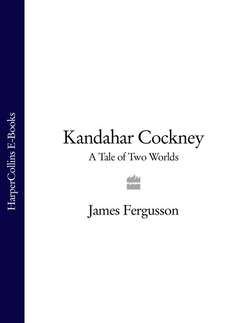Kandahar Cockney: A Tale of Two Worlds

Реклама. ООО «ЛитРес», ИНН: 7719571260.
Оглавление
James Fergusson. Kandahar Cockney: A Tale of Two Worlds
Kandahar Cockney. A Tale of Two Worlds. James Fergusson
Praise
Table of Contents
Author’s Note
Prologue The Old Bailey, Winter 2002
1 London, May 1998
2 June–December 1998
3 January 1999–August 2000
4 June 2000–September 2001
5 September 2001–September 2002
6 Pakistan, October 2002
7 Afghanistan, October 2002
8 London, November 2002
Epilogue
P.S
Profile of James Fergusson by Alex Linklater
Life at a Glance
Top Ten Books
A Critical Eye
Update
If You Loved This, You Might Like…
About the Author
Copyright
About the Publisher
Отрывок из книги
From the reviews of Kandahar Cockney:
‘Funny, pacy, illuminating…it really is as good as everyone’s saying. I recommend it hugely’
.....
Ismail Khan’s comments had important implications for the military integrity of the Northern Alliance. Back in Mazar several days later therefore, I faithfully wrote up the interview for the Independent, dictating to the copy-takers in London at budget-sapping expense via a satellite phone link. I never paused to consider the effect such an article might have, but in retrospect it was a fateful decision, the event that probably marked the start of Mir’s long slide into eventual exile. Rather to my surprise the Independent ran the story. To my even greater surprise I was informed of this editorial decision in faraway London by Mir. He bustled into the Oxfam compound one morning to announce that the BBC World Service had picked up the story and broadcast it across Afghanistan in both Pashtun and Dari. The whole town was talking about it, he said. He revelled in this triumphant proof of the power of modern media, his enthusiasm strangely touching.
It was May Day and General Dostum was planning a spectacular Soviet-style demonstration of military might. A podium had been erected for him and a long column of tanks had congregated in a sidestreet near the shrine the night before. Bunting dangled from the lamp posts and gave the town an almost carnival atmosphere. Genial crowds were already out on the streets, buying lemonade and candy from newly erected stalls or securing the best vantage points for the coming parade. I led Mir to one of the stalls and bought him a celebratory can of orange fizz called Mirinda, a lurid import from Uzbekistan that I had seen everywhere in the markets, virtually the only canned drink available in Mazar. It was the sort of useless foreign luxury that the Taliban would no doubt try to ban if they ever captured the city. Mir smacked his lips and guzzled it down, declaring it werry delicious and his favourite drink ever. I tried it and found it warm and disgustingly saccharine, the Soviet-grade chemicals cloying in my throat. I joshed him about his weight and his incorrigibly sweet tooth. He chatted fervently about his ambition to work for the BBC. It was a beautiful day, the sun was shining, and after the stomach-knotting stress of the trenches Mazar now seemed blissfully normal. And then without warning he disappeared. One minute he was dawdling along as usual at my elbow; the next he was gone. His departure was so sudden that I was left holding his coat. I thought little of it at first, but when the parade started and there was still no sign of him I began to worry. The dust thrown up by the tanks had settled, the crowds had gone home and the sun was starting to set by the time Mir reappeared in the Oxfam compound. He looked pale and was sporting two black eyes. Ewan and I clustered around him as he sat and told us in a tired voice that he had been arrested by Dostum’s secret police, Russian-trained Uzbek goons who had taken him to a cell and beaten him up.
.....